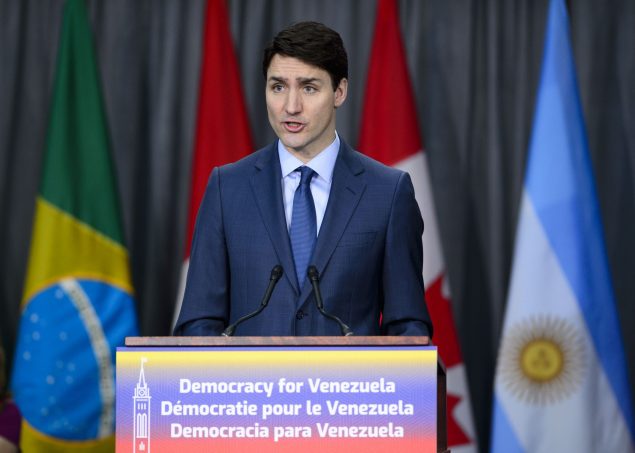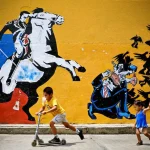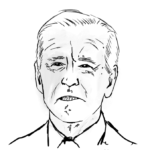
By Maria Paez Victor- February 20, 2020
Canada walked into a political and diplomatic trap of its own making when it took it upon itself to create a self-appointed busybody lobby called The Group of Lima.
The sole purpose of this group is to harass and discredit the government of Venezuela, alleging that they are thereby “defending democracy”. They do so by backing murderous illegal economic sanctions,[1] attempted coups, threats of military intervention, and thus openly and shamelessly are violating international laws of non-intervention. The Lima Group spouts propaganda about supposed human rights abuses and supposed humanitarian crisis. “We see the same smug lies and hypocrisy about the rule of law as they-the Lima Group- openly brag about their violation of international law with every step they take and talk as if they are gods ruling the world…They also make themselves world outlaws”.[2]
What Canada really wants is to get on the “right side” of that most erratic US president, Trump, because it wants the approval of the new NAFTA and it fears US tariffs or sanctions. In other words, Canada is paralyzed with fear of its southern neighbour and is willing to sacrifice – Venezuela. After all, what is Venezuela to Canada? Utterly dispensable. So Ottawa reasons: give Trump Venezuela and he may leave Canada alone.
The Group of Lima is an attack dog for USA foreign policy toward Latin America, which it still considers its “back yard”.
Let’s see who Canada’s is aligned with, the governments that have taken upon themselves to judge and condemn the legitimate government of Venezuela. These supposed paragons of democracy are now Canada’s buddies in the task of trying to deliver to Trump the country with the largest petroleum reserves in the planet:[3]
It is a an astonishing fact that before the US economic sanctions Venezuela was rated as “High” Human Development Index (HDI), the second best in HDI’s rankings, 78th out of 189 countries, and outranked in HDI the majority of Lima Group countries including Colombia, Guatemala, Guyana, Honduras, Paraguay, Peru, St Lucia, Haiti, Bolivia.[4] And even now, despite economic sanctions it still outranks most.
Colombia
Colombia is the number one producer of cocaine in the world. Narco-traffic is rampant. In what has been called a continuous genocide, every 4 days a unionist is killed.[5] In 2019, there were 6,466-targeted assassinations. In the last 4 years, 555 women human rights defenders have been assassinated; in the first fifteen days of 2020 there were 20 women human rights defenders assassinated. Despite the Peace Pact, 170 former guerrillas who laid down their arms have been assassinated.[6]According to the Colombian Commissariat of Jurists, impunity for human rights abuses is around 90%. Between 2013 -16, 700,000 people were “displaced”. And malnutrition has killed 2000 children under the age of 5 in the last decade.[7]
RELATED CONTENT: Shut Down Canada Until it Solves its War, Oil, and Genocide Problem
Guatemala
According to Human Rights Watch, there is widespread impunity in this country. A major concern is violence against unionists, lawyers, and journalists.[8] Guatemala has one of the highest murder rates in the world; in 2018 there was an average of 101 murders per week, attributed in part to drug trafficking and gangs.[9]
Honduras
According to the UN Human Rights Commission, since the coup d’etat, in 9 years there have been 51,000 people assassinated, mostly young men between the ages of 14 and 30 years old. The Human Rights Watch (2018) states that violent crime is rampant and the country has one of the highest murder rates in the world. The November 2017 elections resulted in 22 deaths and 1,300 detentions. Between 2014 and 2016, there were 25 journalists killed; in 2016 there were 134 lawyers killed. The IACHR describes Honduras as “the most hostile and dangerous countries for human rights defenders in the Americas.”[10]
Guyana
Guyana is one of the poorest countries in the Americas where poverty is widespread. According to UNICEF, Indigenous communities have a poverty rate between 61% and 94%, and lack access to land, culture, medicines, food, education and safety.[11] According to the New York Times, “the civil service is corrupt”[12]. According to the US State Department, men, women and children are subject to human trafficking.[13]
Peru
Six of its former presidents are either in jail or in exile for corruption and the current president has not been elected. According to the Peruvian National Institute of Statistics and Information in 2016 the overall poverty rate was 20.7% of the general population, but the rural poverty was at 43.8% and 13.2% lived in extreme poverty. The malnutrition in children has reached an appalling 53%. According to Human Rights Watch, violence towards women is a significant problem in Peru; in 2017 there were 368 feminicides.[14] Amnesty International states that both state and non-state actors continue to threaten and harass human rights defenders, particularly those working on issues of land and environment. These defenders were criminalized through the courts with high penalties.[15]
Panama
The European Union has again listed Panama on its black list of fiscal paradises due to its lack of transparency. [16]The legal system is seriously challenged by widespread political interference in the appointment of judges, and there is no independent body to investigate corrupt public servants.[17] Discrimination against racial minorities is common; indigenous groups struggle to uphold their legal rights to land. Corruption and impunity are serious challenges affecting the justice system and highest levels of government.[18]There is widespread anger over brazen corruption in the last elections and anger over government malfeasance following the bribery revelations of the Panama Papers.[19] There is a large inequality gap between urban and rural population as the latter is the poorest, as 20% of the population enjoys 50% of the country’s wealth while 40% control only 12% of the wealth.[20]
Bolivia
The first indigenous president of the Americas, Evo Morales, was deposed on Oct. 31, 2019, in a bloody coup d’etat led by extremist, religious fanatic, right-wingers that have unleashed racist attacks on the indigenous peoples. An unelected, self-proclaimed usurper heads the government. There was a massacre of 34 indigenous leaders who resisted the coup and more than 700 injured. Up to now, 53 community radios have been closed.[21]
Brazil
President Bolosonaro repeatedly praises Brazil’s former 21year military dictatorship that killed more than 3,000 people. In 2019, the police killed 426 people in Sao Paulo and 881 in Rio de Janeiro.[22] Bolsonaro has threatened journalists, attacked universities with cutbacks, and replaced members of the Special Commission on Political Deaths and Disappearances with his party members nostalgic for the dictatorship. His government is characterized by religious fundamentalism, authoritarianism and cruelty especially towards minorities and the press. There is scant or no concern for liberal or democratic values. [23]The devastating Amazon fires took place on indigenous and conservation lands and attributed to developers. Bolsonaro has encouraged the fires and he is a climate change denier. Bolsonaro tried to hide the fires from the world scrutiny. [24]
Paraguay
The UN Human Rights Commission indicates that people, including children, have been poisoned through contaminated soil, land and water by widespread use of toxic agrochemicals. [25] According to Amnesty International, indigenous people continue to be denied their rights to land and free, prior and informed consent on projects affecting them. Human rights defenders and journalists have been persecuted amid violations of the right to freedom of expression. [26] And Democracy International has assessed that the country has serious corruption and impunity issues, which are undermining the rule of law and are the focus of citizen dissatisfaction.[27]
Chile
Since October 2019, Chile has experience the worst riots since the Pinochet era. Chilean youths started the protest over an untenable 3% raise in metro fares, which was the tip of the iceberg in decades of privatizations, increase of cost of living and marked inequality. President Piñera acted with undue force; in one weekend there were thousands of arrests and 10,000 troops on the street. Protesters are still demanding the president’s resignation and a new constitution. Nearly 2,500 have been injured and
2, 840 arrested (Dec. 2019). Human Rights violations include torture, sexual abuse and sexual assault of protestors, excess use of security forces that include 222 people whose eyes have been injured or blinded, all these abuses substantiated by Human Rights Watch and Amnesty International.[28]
Ecuador
There is a precarious political situation of underlying social conflict. There has been a wave of protests which reached unprecedented levels. The president, Lenin Moreno, declared a state of emergency for 60 days and even declared the city of Quito in a state of siege last October. The police and security forces have not been restrained; as there have been illegal detentions, hundreds of wounded and at least 7 killed by these forces. Citizens are protesting austerity measures demanded by the IMF and indigenous people in particular are being criminalized for their protests. [29]Moreno is being accused of corruption due to his links with an offshore company established by his brother, Investment Corp. of Belize.[30] The UN Special Rapporteur, Dainius Puras has declared that Ecuador suffers endemic violence and discriminations with violence against women and girls being endemic.[31]
RELATED CONTENT: Canadians Protest Lima Group Meeting in Ottawa – An Interview with Pierre LeBlanc
Haiti
Haiti is one of the poorest and most unequal countries in the world, where 1 in 2 Haitians live in poverty.[32] There is widespread abuse of human rights and a resurgence of gang violence with involvement of police and other officials. Nearly 38,000 people, 70% who are women and children, still live in displacement camps after the 2010 earthquake. Cholera has infected more than 800,000 people and killed 10,000. Prisoners languish in inhumane and overcrowded jails. One half of Haitians over 15 years of age are illiterate. Violence against women is rampant. Between 225,000 and 300,000 children are used in child labour, denied education and abused. [33]After a delay of one year, finally elections were held and Jovenal Moise was elected but with a turnout of only 10% of registered voters. There is a profound disillusionment of the country’s political system, the elections becoming a theatrical performance to ensure international credibility.[34]
By contrast, in Venezuela, despite the vile US illegal economic sanctions that impede the sell of petroleum, despite the losses of over $130 billion, which include the US stealing Venezuelan assets, Venezuela has over 50,000 communes and collectives that are growing food, more than 6 million people receiving subsidized food baskets monthly, and 3 million housing units have been built. There is social peace and President Nicolás Maduro is recognized and respected by the great majority of the UN members, which have their diplomatic missions in Venezuela.
It is ironic that Prime Minister Justin Trudeau should be campaigning for a Canadian seat in the UN Security Council when Canada keeps company with a group such as Lima. And it is likely he will not succeed. Latin American and Caribbean public opinion has turned against Canada. What else would you expect?
A second obstacle to Canada’s ambitions, is the countrywide pipeline protest of the Wet’Suwet’En indigenous nation that has galvanized Canada, and of which the Americas and the broader world is very much aware.
The Group of Lima is due to meet in Ottawa on Thursday, Feb. 21, 2020. The best that Canada could do at the meeting is to follow the example of Mexico’s López Obrador and resign from this venal group.
Notes.
- Economic sanctions have directly killed 40,000 Venezuelans in 2017-18. Mark Weisbrot & Jeffrey Sachs, CEPR, 25 April 2019 ↑
- Christopher Black, “The Lima Group: International Outlaws and regime Change Conspirators”, Global Research, 6 Feb. 2019, https://globalresearch.ca/lima-group-international-outlaws/5667659 ↑
- Alex Ward, VOX, 20 Feb. 2019: “Andrew McCabe claims Trump wanted war in Venezuela because “they have all that oil.”” Rob Urie, “Iran, Venezuela and the Throes of Empire”, COUNTERPUNCH, 20 May 2019:” John Bolton stated that the goal of regime change in Venezuela is to gain control of Venezuela’s oil.” ↑
- Gregory Shupak, “US Media Erase Years of Chavismo’s gains”, FAIR.org, 2019 ↑
- Enrique Ortega Salinas, “The Most Difficult Time”, CubaGebate, 31 March 2019 ↑
- Yldefonso Finol, “Colombia: genocidio continuado en la dictadura de la muerte”, ensartaos, 17 Jan. 2020-02-17 https://www.ensartaos.com.ve/la-muerte-por-encargo-es-parte-ahora-y-desde-hace-decadas-de-la-vida-normal-en-el-vecino-pais/ ↑
- Colombia Report, 6 April 2018, https://colombiareports.com/colombia-systematically-violating-human-rights-report/ ↑
- Guatemala Profile, Human Rights Watch ↑
- Wikipedia.org, https://en.wikipedia.org/wiki/Crime_in_Guatemala ↑
- Human Rights Watch: https://www.hrw.org/world-report/2019/country-chapters/honduras ↑
- UNICEF, https://www.unicef.org/guyana/SitAn_on_Ameridian_Woman_and_Children_-_Final-web.pdf ↑
- New York Times, Clifford Krauss, “The $20 Billion Question for Guyana”, 20 July 2018 ↑
- Guyana. Trafficking in Persons Report, 2010, US State Department, 14 July 2010 ↑
- Human Rights Watch Report, https://www.amnesty.org/en/countries/americas/peru/report-peru/ ↑
- Amnesty International, https://www.amnesty.org/en/countries/americas/peru/report-peru/ ↑
- TELESUR, 18 Feb. 2020 ↑
- Transparency International, Victoria Jennet, 2014, “Overview of Corruption in Judicial and Prosecution Services in Panama” ↑
- Freedom House, https://freedomhouse.org/report/freedom-world/2018/panama ↑
- https://apnews.com/17247d859ec74adc851655a42e390319 ↑
- www.nationsencyclopedia.com ↑
- TELESUR 18 Feb. 2020; https://jacobinmag.com/2019/11/coup-bolivia-history-evo-morales-jeanine-anez ↑
- The Guardian, 4 September 2019 https://www.theguardian.com/world/2019/sep/04/jair-bolsonaro-michelle-bachelet-brazil-police-killings ↑
- NACLA, https://nacla.org/news/2019/08/21/bolsonaro-and-brazil-court-global-far-right ↑
- The Guardian, 26 Aug. 2019 https://www.theguardian.com/commentisfree/2019/aug/26/fires-are-devouring-the-amazon-and-jair-bolsonaro-is-to-blame ↑
- https://www.ohchr.org/EN/NewsEvents/Pages/DisplayNews.aspx?NewsID=24890&LangID=E ↑
- https://www.amnesty.org/en/countries/americas/paraguay/report-paraguay/ ↑
- http://democracyinternational.com/projects/paraguay-rule-of-law-assessment/ ↑
- https://en.wikipedia.org/wiki/2019–20_Chilean_protests ↑
- “Social land Political Earthquake in Ecuador”, Democracia Abierta, 11 Oct. 2019, https://www.opendemocracy.net/es/democraciaabierta-es/terremoto-social-y-pol%C3%ADtico-en-ecuador/ ↑
- TELESUR, 20 Feb. 2020 ↑
- UN, 27 September 2019https://www.ohchr.org/EN/NewsEvents/Pages/DisplayNews.aspx?NewsID=25065&LangID=E ↑
- World Bank, https://www.worldbank.org/en/topic/poverty/publication/beyond-poverty-haiti ↑
- https://www.hrw.org/world-report/2019/country-chapters/haiti ↑
- Jake Johnson, ‘Haiti’s Eroding Democracy”, https://www.jacobinmag.com/2017/02/haiti-election-democracy-neoliberal-clinton-jovenel-moise-martelly-aristide-preval-duvalier/ ↑
María Páez Victor, Ph.D. is a Venezuelan born sociologist living in Canada.
Featured image: Prime Minister Justin Trudeau delivers brief remarks at the opening session of the 10th ministerial meeting of the Lima Group, in Ottawa, on Feb. 4, 2019.

Maria Paez Victor
María Páez Victor, Ph.D. is a Venezuelan born sociologist living in Canada.
- July 21, 2024
- April 24, 2024




